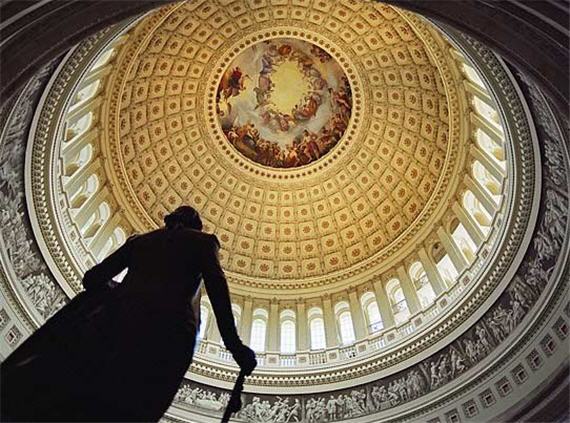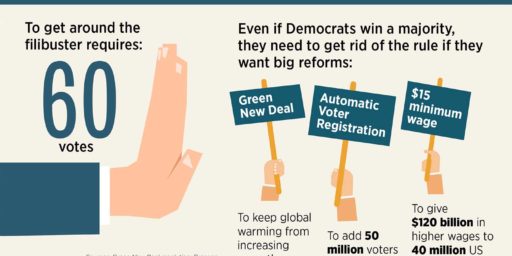Thoughts On Partisanship, The Senate, And Filibusters
The abuse of the filibuster is just a symptom of a much wider problem.
In response to my earlier post on the filibuster, Ezra Klein says:
We don’t know how to fix partisanship. It’s ebbed and flowed at different times in our polity, and manifested in our legislative institutions in different ways. As Gregory Koger emphasizes in his book on the filibuster, it was the House of Representatives, not the Senate, that first suffered from an overuse of filibuster-like practices, and they were eliminated when the body became unmanageable.
The good news is that we don’t need to fix partisanship, which is really nothing more than organized disagreement. All we need to do is ensure that our system can function amid it. There’s no great trick to that, as plenty of other countries, the House of Representatives, dinner tables where children want to eat dessert first, and “American Idol” all show. What is dangerous is to allow a system set up for a consensus-based political culture drift into highly polarized political culture. Rules can be changed to fit political realities, but political realities cannot usually be changed to fit rules.
I agree that the rules can, and should, be changed as I noted in my first post on the topic this morning. The manner in which the Republican minority in the 111th Congress was able to stop action on issues like DADT repeal by utilizing Senate rules in a manner that required a supermajority for every piece of legislation is no way to run a deliberative body. It’s important to protect the rights of a legislative minority, but not via a rule that results in the minority having far more power than their numbers suggest. I don’t support the complete elimination of the filibuster, but reforming it so that it can’t be used to stop the daily operation of the Senate (along with other changes like eliminating the secret hold) makes perfect sense.
As far as partisanship goes, the problem that we have is that both parties now spend more time appealing to the extreme elements of their respective bases than to the broad middle of American politics. The filibuster is just a weapon in that war. Reforming it in the manner advocated by Jeff Merkley and others may make it easier for a Senate majority to govern, but it’s not going to end the partisan fighting that is at the core of public disdain for Congress in particular and national politics in general.







Partisans have some cognitive dissonace when they support filibuster. They think the are opposing the other side, but what they really fear is the middle.
The other extreme is not going to win the vote in full house or senate.
I would disagree with you just a bit. With the current filibuster rules, it makes political sense to oppose nearly all legislation when you are the minority. You can then claim that the party is ineffective. That it cannot deliver on its promises. There is almost zero motivation to participate in governing. Eliminating the filibuster, or weakening it, might make the minority party more willing to participate. On most major legislation the party in power will likely want political cover from the opposition. Without the filibuster the minority party would have to negotiate for compromise if they wanted to participate.
Steve